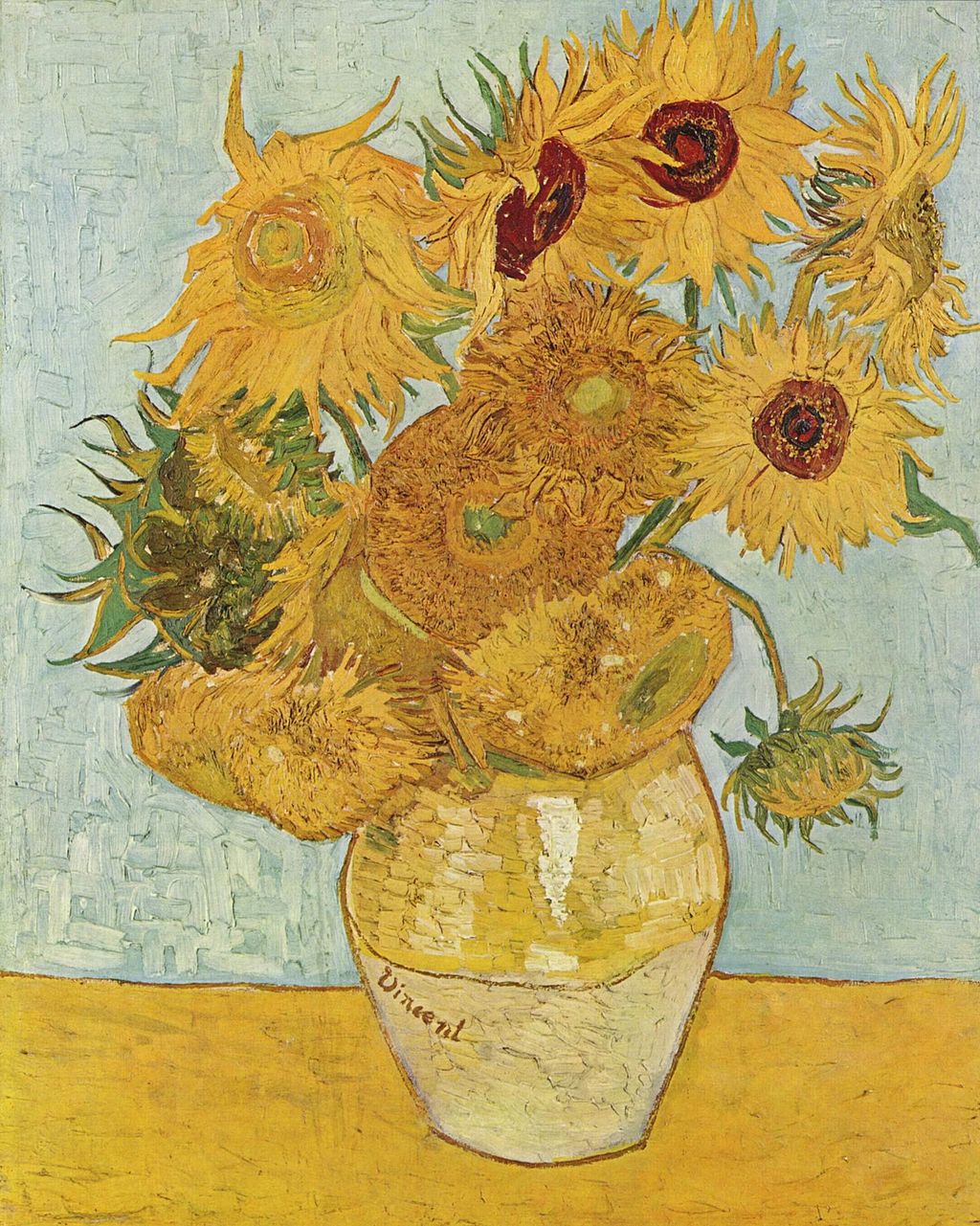“This is Don’s team now”: Adelaide’s unassuming search for greatness
Three years ago this month the Adelaide Crows were in disarray.
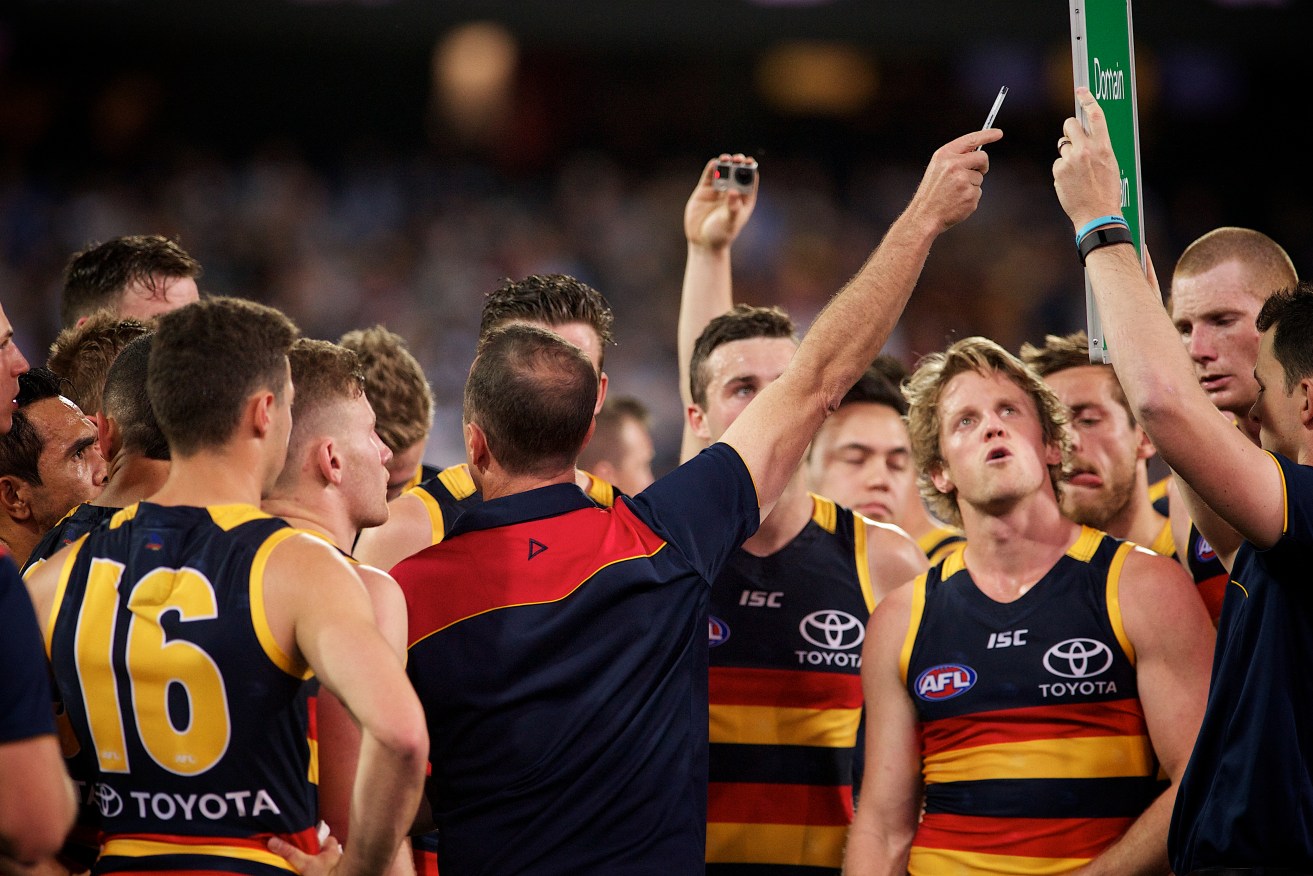
Don Pyke shows the way to his charges during last week's preliminary final. Photo: Michael Errey / InDaily
They had just sacked their coach, Brenton Sanderson, only two seasons after he had led the team to a narrow preliminary final loss – and only a year after the board had signed off on a contract extension that was to see the former Cat remain at the Adelaide helm until the end of 2016.
The fallout at home was bitter, and the reaction interstate incredulous.
Perhaps the most pointed barb hurled at the time was from the influential Fairfax football scribe Caroline Wilson, who described Adelaide as a “once-great club”, now no longer.
In the time since, the club has faced darker times – much darker – but has certainly never plumbed the depths of national opprobrium as it did that September.
And the man who wore most of it was chairman Rob Chapman, the banking executive who had returned home for good in 2012 to devote more time to his two great loves: family and footy.
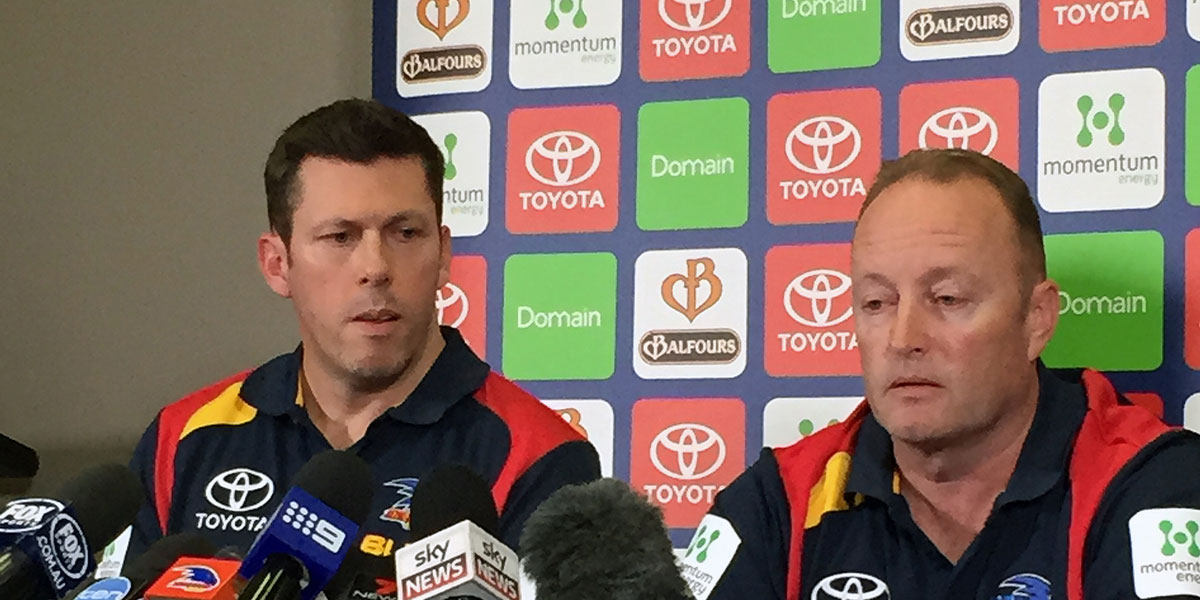
Crows chairman Rob Chapman with CEO Andrew Fagan (left), after the death of coach Phil Walsh.
The ghost of premierships past has hung over the Adelaide Football Club for a long time.
Chapman’s tenure came after the Gary Ayres era that followed the brief but incandescent candle that was Malcolm Blight’s reign. He joined the board in 2006, became chairman in ’08.
In that time he’s overseen the tenure of four senior coaches and two interim coaches, as the memories of the famous flag double have gone from milestone to millstone.
“It’s been a long time between drinks,” he says ruefully.
“Too long, frankly.”
Chapman well recalls the euphoria of that late-millennial premiership charge, a snatch-and-grab on the Victorian silverware to bring the cups home to a state still looking for something to celebrate in its post-State Bank malaise.
“I love that [premiership] era – I’ve been reflecting on it… I was here in ’97, I was here in ’98,” Chapman tells InDaily from Melbourne airport, where he has attended a club chairmans’ meeting and is awaiting a flight home for a board meeting.
“It was 20 years ago, but I can vividly recall where I was, who I was with… I’ve been getting a lot of people ringing me about it this week.”
Today he will board another Melbourne-bound flight, and hope it will carry him to the prize that will vindicate the decisions he’s taken in his years at the helm.
This is Don’s team – make no mistake about it
As the Crows of 2017 wing their way to the club’s third Grand Final after a 19-year wait, Adelaide supporters remain misty-eyed about the mystique of Blight, Jarman, McLeod et al. But, Chapman says, “it would be nice for these guys to create their own little bit of mystique”.
Did he ever doubt this day would come, amid all the setbacks and blown chances?
“If you don’t get some success along the way everyone gets a bit worried,” he admits.
It was this that ultimately prompted the 2011 departure of Neil Craig, whose era had promised so much, with top-two finishes in 2005 and ’06. But the club never made a grand final, and finals heartbreaks slowly gave way to minor round malaise.
“I still think Neil Craig is one of the greatest people I’ve met in football,” Chapman says now.
“What he stood for, the way he went about things – just his football nous… I don’t speak to him as regularly as I used to, but when I do I enjoy every conversation.”
Blight himself reflected recently at the cadence of fortune that finally swung his way – after he appeared doomed to fall agonisingly short in his coaching career at Geelong – but that did not turn for Craig.
“I don’t like the words ‘wasted opportunities’… but I reckon he was real stiff,” Chapman reflects.
“He had great courage to walk away from the football club… no-one pushed him; he came to the realisation himself that the club might have needed to go in a different direction.
“And for that decision I’ll always hold him in the highest regard.”
Craig retired from football altogether at this season’s end, but Chapman notes the Gold Coast Suns are still in the market for a mentor. He can see the veteran having one more crack, if opportunity ever knocks again.
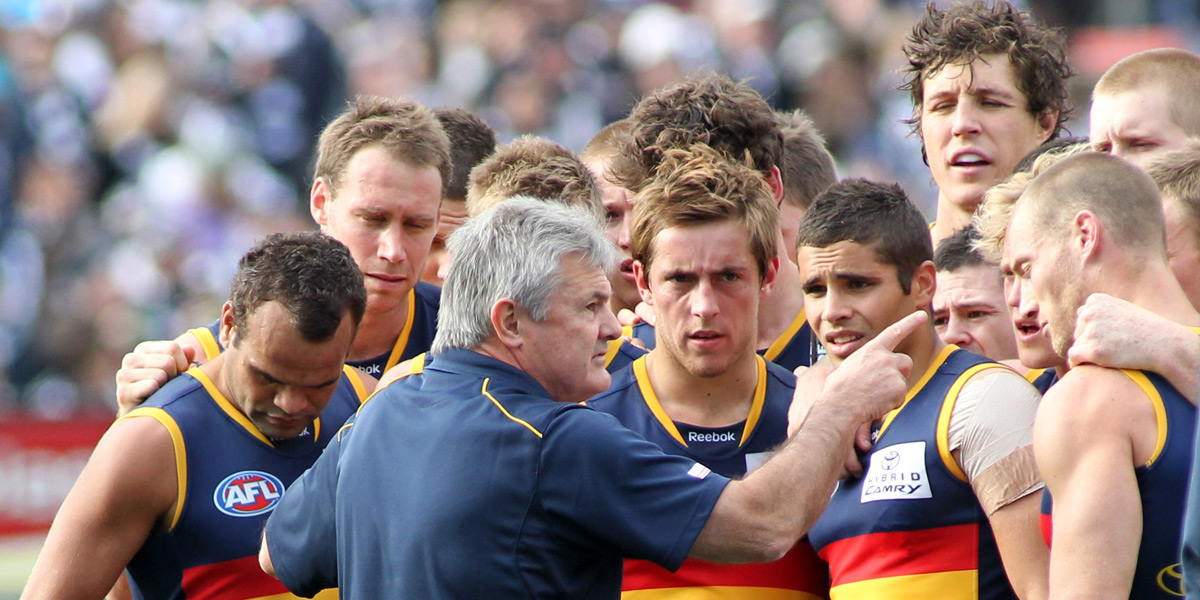
Neil Craig addressing the Adelaide players.
But despite a flying start for a young new coach in Sanderson, with a top-two finish and a preliminary final berth, things fell away quickly.
In 2014, after all the hype around SA football’s new Adelaide Oval home, the Crows lost three of their first four games at the venue, and fell short of finals for the second year running.
It had been a difficult period for the club: it’s hard-won on-field reputation forged in that last-gasp loss to Hawthorn in 2012 was quickly undone by the fiasco that saw forward Kurt Tippett depart with no recompense, and the club hit with heavy sanctions over his dodgy contract.
A year later, Sanderson’s coaching mentor Dean Bailey succumbed to lung cancer.
It was a troubled time.
But in the end, it was Sanderson who copped the axe.
And Chapman who copped the backlash.
Local and national pundits vented their spleen and fingers, too, were pointed at the playing group for supposedly helping engineer the coup.
“It was a difficult decision,” Chapman says now.
“When you’re dealing with people and having to make ruthless decisions, that’s always hard. And you have to do it with respect. But they’re just hard…”
But, he maintains, “it was a moment in time that we just knew was the right thing to do”.
“We had to make some change. And we made it.
“Had we not, I think we’d be in a very different position today.”
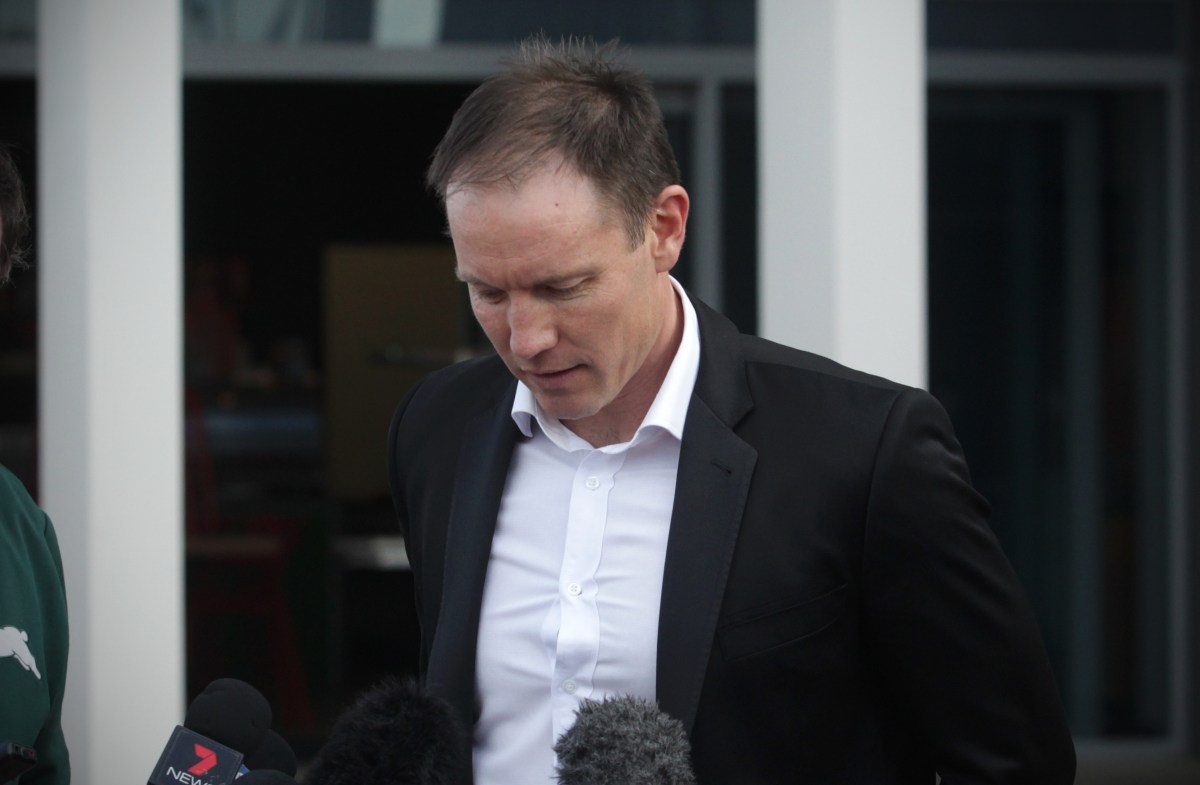
Brenton Sanderson addresses media after his sacking in 2014. Photo: Ben Macmahon / AAP
Things changed fast.
A new CEO, Andrew Fagan, came in – an outsider, from a Rugby Union pedigree – to replace the departed Steven Trigg, and the club sought out an influential veteran assistant at its crosstown nemesis Port Adelaide to become its senior coach.
Phil Walsh’s tenure began with great promise and a new broom – including a new captain, the larrikin power forward Taylor ‘Tex’ Walker.
The club won its first three matches of 2015, including a round one demolition of preliminary finalists North Melbourne, in which Walker kicked six goals.
The change was coming.
But then, midway through the season, talk of finals, form and the eternal will-he-won’t-he questions about the club’s biggest star Patrick Dangerfield returning to Victoria suddenly evaporated.
On July 3, South Australia woke up to the news that Phil Walsh had been stabbed to death in his home.
His son Cy was ultimately found not guilty of murder by reason of mental incompetence.
The club grieved, off-field and on.
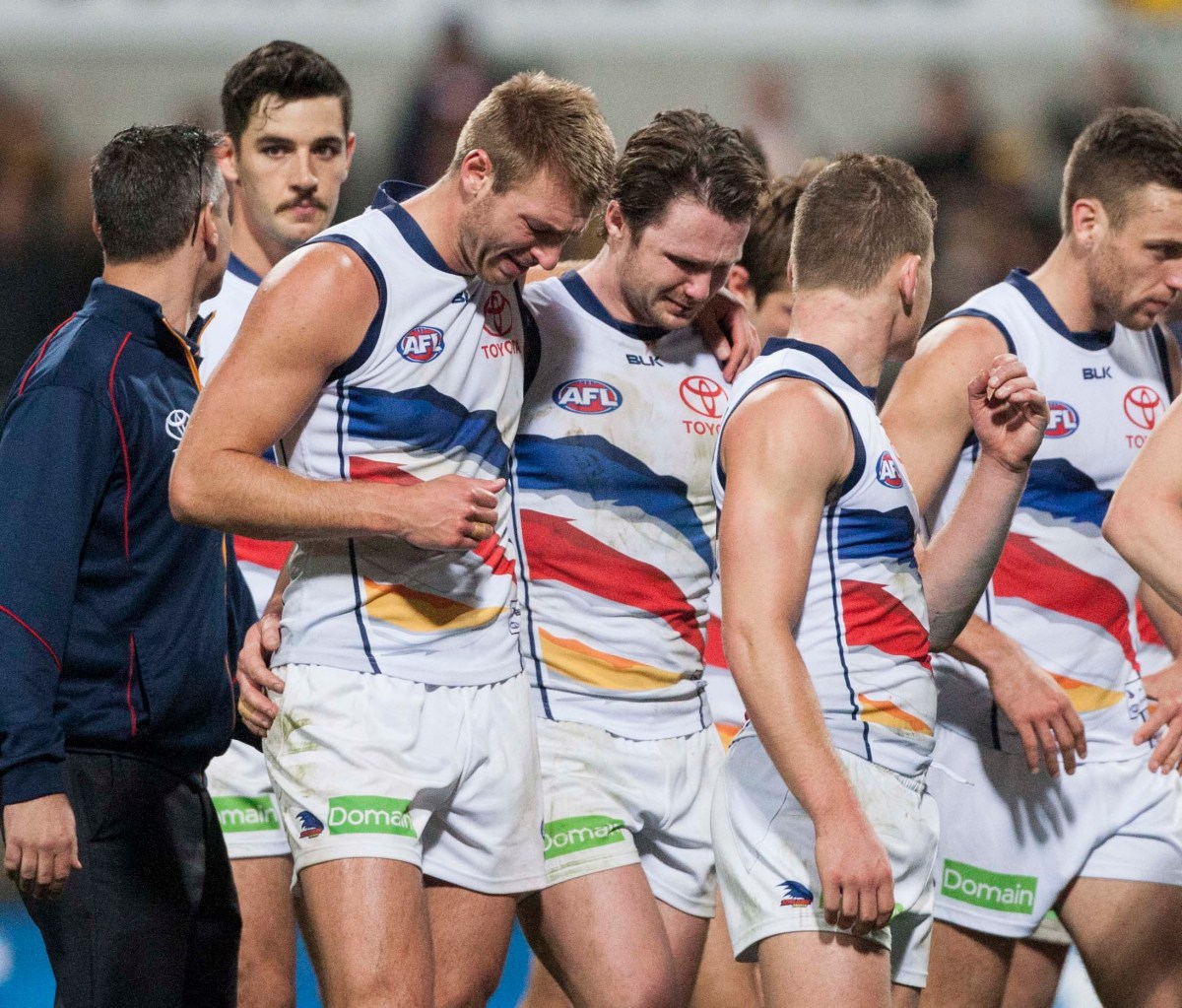
Emotional Adelaide players leave the field after their round 15 defeat to West Coast – the first match they played after Walsh’s death. Photo: Tony McDonough / AAP
And again, it was Chapman who became its public face. This time, of course, there was no sneering scorn from the national media. Just an outpouring of sympathy and disbelief.
“It was an incredibly difficult period in our club’s history,” he recalls.
But he is at pains to emphasise that at its heart the episode remains a devastating family tragedy, whose legacy continues to impact Walsh’s widow Meredith and daughter Quinn.
It was a point made succinctly on the morning of the event, when Major Crime Detective Superintendent Des Bray highlighted that “it’s just absolutely terrible when families are torn apart in such tragic circumstances… for any family, regardless of who it is, it’s one of the worst things you could imagine could happen to you”.
“The only thing that’s different with this is that he has a high profile,” he noted.
Walsh did indeed have a high profile, and had cultivated an easy, avuncular charm in his regular media conferences.
In the days before an away trip to the Gabba to face the Lions, he stole national media attention by waxing lyrical about the task at hand.
“I’ll sound again like a bit like a weirdo,” he told the assembled reporters at Adelaide’s West Lakes base, “but great art comes from a level of frustration”.
He recalled visiting the Van Gogh museum in Amsterdam, gazing upon the still-life sunflowers and thinking: “There’s a man with great frustration.”
“For a bogan from Hamilton like myself, I could actually see beauty in that frustration,” he mused, suggesting the Crows’ season – which had started to stutter amid mounting losses – could yet turn sunflower-gold.
“So although our fans are frustrated, and we’re frustrated, we like to think there’s some masterpieces still to be painted this year.”
The Brisbane game turned out to be the last Walsh would coach.
And in the end, the season’s masterpiece – an epic elimination final win against the Bulldogs in Melbourne – was overseen not by Walsh, but by his former assistant, Scott Camporeale, who stepped into the breach in the club’s time of need.
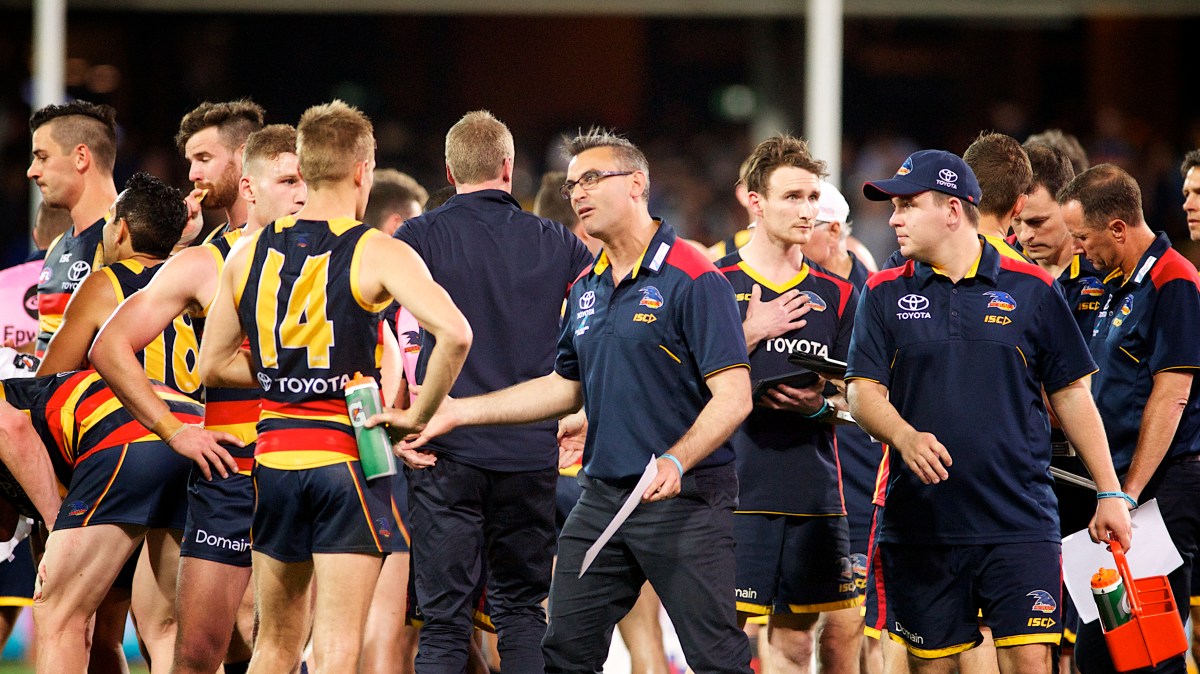
Camporeale has a word with David Mackay and Rory Laird during the Crows’ win over the Cats last week. Photo: Michael Errey / InDaily
But amid all the justified hype about ‘resilience’ this Grand Final week, Chapman sounds a note of perspective.
“I go to lengths to point out that if it was difficult for us, imagine how difficult it is for the Walsh family,” he says.
“I go to great lengths to stress that.
“But in his very short period of time with us, he had the most significant impact, on all of us.”
“On all of us,” he repeats, after a moment’s silence.
“It’s hard… it was the hardest thing any of us have ever had to endure, and all of us still get emotional thinking about it.
“And I’m sure we’ll be thinking about it on [Grand Final] day, win or lose.”
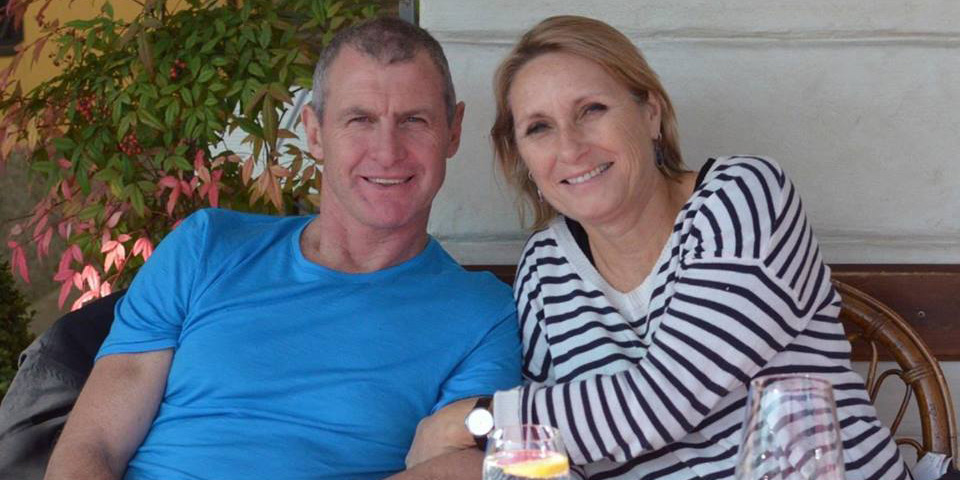
Phil Walsh with wife Meredith.
Those who knew Walsh well will say his easy charm didn’t come easy.
That facing the limelight gave him more nightmares than coaching against a full-strength Hawks side in full premiership swing.
But he nonetheless forged a jocular public persona, despite his well-worn reputation as a media skeptic.
The man who ultimately replaced him is a very different proposition.
Succinct to the point of terseness, Don Pyke has largely avoided the cult of personality that should, by rights, come with coaching the Crows to successive finals appearances, largely because he does not give much of himself away.
“He doesn’t, does he?” laughs Chapman.
“He has his own personality, but it’s a bit guarded,” he explains.
“I just see him as really, really focused… he knows what needs to be done.
“He’s had success, and this is the invaluable part of his coaching over the last three weeks…
“He’s been there before, three times [and] you can’t buy that sort of stuff.”
Pyke won flags as a player with West Coast in 1992 and ’94, and was Adam Simpson’s assistant at the same club when, 21 years later, it contested a losing Grand Final against the Hawks.
Significantly – before leaving to pursue a successful business career at the height of the WA mining boom – Pyke was also Neil Craig’s understudy during the high-flying Crows years of ’05 and ’06, when the club fell short at the final hurdle before Grand Final day.
There is, superficially, a lot of Craig in Pyke’s approach. He has been criticised for sticking with his favoured strategy when in dire straits, rather than throwing the magnets whimsically at the whiteboard, as Blight so famously used to.
But Pyke’s favoured strategy has largely paid big dividends, and his taciturn persona is strangely reflective of the team he coaches: a team that goes about its business efficiently, unassuming, with little hype.
A team that, as Phil Walsh was fond of saying, gets the job done.
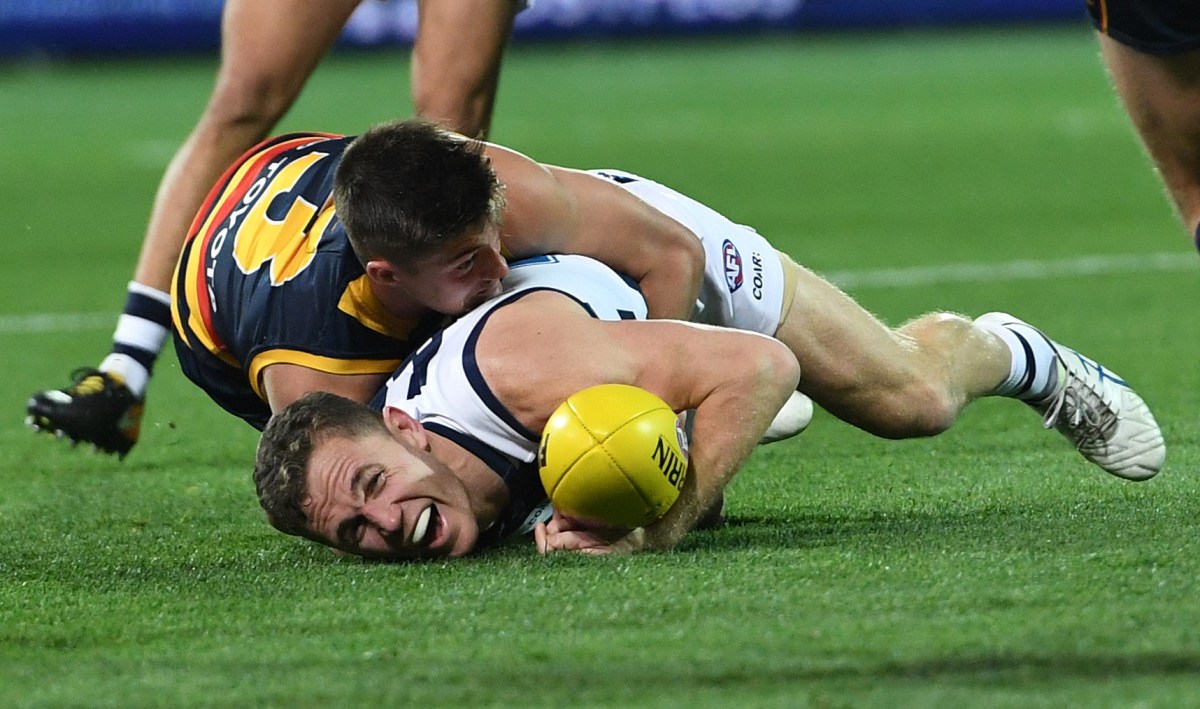
GETTING IT DONE: Riley Knight tackles Joel Selwood in the Preliminary Final. Photo: Tracey Nearmy / AAP
“He’s so big on team, which everyone talks about… but I just see this being a real part of him,” Chapman notes.
“He’s single-focused – he exists to get the job done.
“He’s not looking for limelight or fanfare.”
He notes too that behind closed doors he greatly enjoys Pyke’s company. The pair, quite by chance, live in close proximity – an Adelaide moment, to be sure.
The evolution of the team under its coach has been part of a “club-wide process”, Chapman claims.
“It’s the way we go about it – everyone shares the load. No-one stands out; there’s not a dominant personality within the club.
“Everyone knows their role, and we play it.”
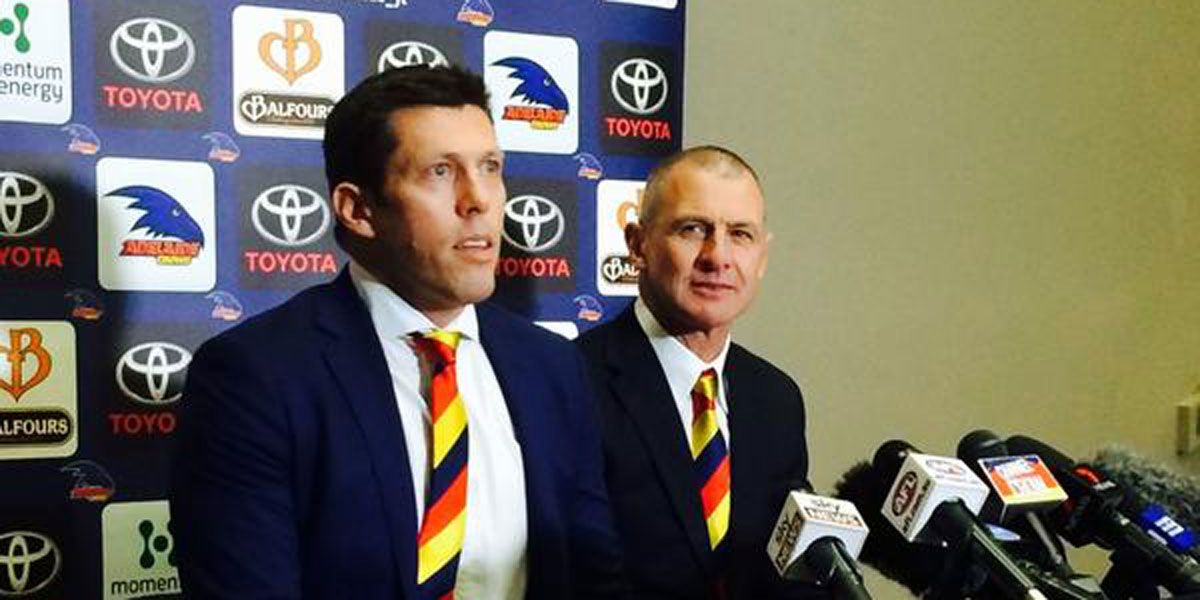
THE RIGHT PEOPLE: Phil Walsh (right) is announced as coach with new club CEO Andrew Fagan.
When he appointed Fagan and Walsh, Chapman spoke of putting “the right people in the right roles”.
It rings like a mantra born of his boardroom background – part business lingo, part sporting cliché.
“What I’ve worked out,” he says of his nine years at the club, “is that these things [Grand Finals] are really, really hard to get into… you need a lot of things going right.”
“From our perspective, it’s taken us three or four years, maybe longer, to get all the pieces in place.
“And that’s getting the right structure, the right people in the structure, and getting them all doing the right things.”
But, he insists, “history tells you that does get you to sustained success”.
It would be nice for these guys to create their own little bit of mystique
“We’ve got a very good board… we haven’t had the consistency and stability that we would have liked, for obvious reasons, but we’ve had it now for a couple of years and we’re starting to get the benefit of that.
“And once you get here, the trick – without getting ahead of ourselves – is to make sure we stay at the top.”
He cites the likes of Hawthorn, Sydney, even Brisbane in the early-2000s, before they fell into a deep hole, as clubs that managed to sustain success on-field by – in part – having the right people in the right roles off-field.
Not that Adelaide, the “once-great club” derided by the Melbourne press, has ever been truly unsuccessful.
“That’s a fair call,” Chapman says.
“Whilst I’ve been chairman, we’ve had this philosophical view that we don’t bottom out – I don’t think our fanbase would allow that.”
Hence the rise of the much-derided phrase ‘organic growth’, which Chapman suggests was a media invention, although it was actually list manager Justin Reid that coined it after last year’s failed trade bid for Carlton star Bryce Gibbs.
But despite the sniggers, the concept has been “fundamental to our success, and to our philosophy”, says Chapman.
“We haven’t had the draft picks – you know the stats on our top 10 and first-round draft picks.”
The Crows’ highest draft selection playing tomorrow will be Daniel Talia, taken with pick 13 in 2009.
The club’s highest Brownlow vote-getter this week was Rory Sloane, drafted at pick 44.
Chapman notes that when the AFL-created GWS juggernaut jetted into town for its qualifying final belting, he shared a chat with his fellow chairman Tony Shepherd.
“He thought the bloody draft stopped at pick 20,” he laughs.
“I told him: ‘It goes to bloody 90, mate!’”
Which is about where the Crows picked up pacy wingman Rory Atkins, another lowly selection (pick 81) who will take the Grand Final field.
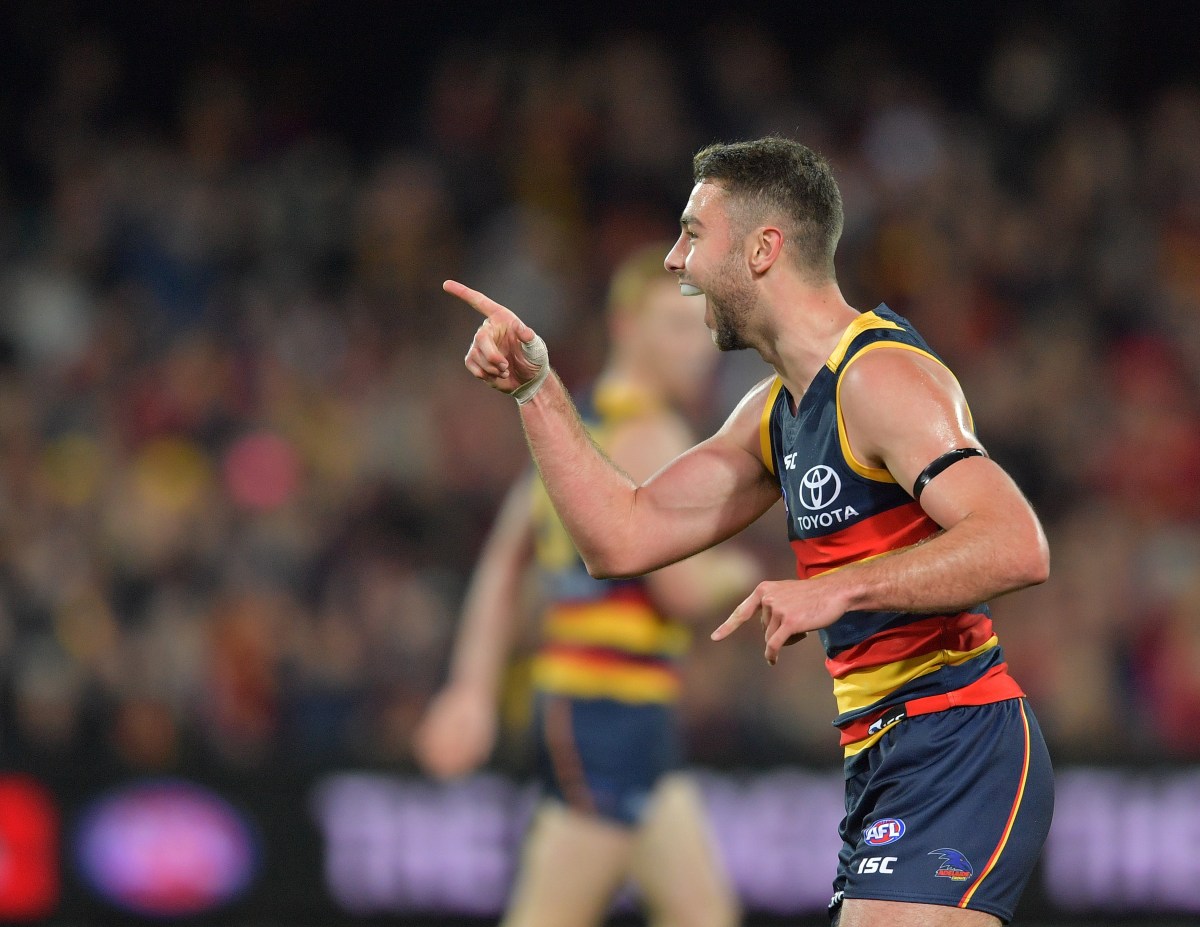
Rory Atkins celebrates a qualifying final goal against GWS. Photo: David Mariuz / AAP
Win or lose, the Grand Final marks a club returning to its former prestige.
It may even mark itself as a ‘destination club’, rather than the team that has seen successive stars return to their home states – or worse, SA-born recruits lured to leave.
“I think it’s been a destination [club] for a little while,” Chapman ponders.
“The parents that I speak to, the player agents I speak to, the current players within the industry who get to experience other clubs and the way they go about it, all tell us we’re doing some good things.”
But still they leave. The club is likely to lose Victorian Jake Lever at season’s end, with the preliminary final’s five-goal forward Charlie Cameron also linked to a ‘go-home’ trade.
But Chapman has a blunt – and unsettling – message for Crows supporters fervently hoping the days of Tippett, Davis, Bock, Gunston, Dangerfield et al are over.
“We’ll see more movement, not less,” he warns.
“I think the landscape’s changing a bit, and it changes the mindset of players and clubs.”
So is that a good thing?
“Well, from a traditionalist point of view – which basically I am – no. But we’re not naïve enough not to know there’s change, and we need to adapt to that.
“All we can do at that specific period in time is put the best offer forward and have the best environment in which they can work.”
And that aside, he says, departures are “nothing to do with the football club”. After all, there are plenty of reasons a player might seek a new home.
“For Patrick Dangerfield, it was to go back home and have a family. And Phil Davis… mate, if my son was offered the money he was offered to have a career in a new club – and be the captain – you’d be foolish to provide alternative advice.”
So Adelaide had to make do without them.
For Chapman, it’s a testament to a club devoted to getting the best out of what it has, and “that’s exactly what Don has done here”.
Despite the long shadow cast by his coaching predecessor, the chairman insists: “This is Don’s team; make no mistake about it.”
“That was a really, really hard thing to step into, but he was astute enough just to work out what he had to do.”
Chapman checks himself for the cliché, but notes Pyke “didn’t throw out the baby with the bathwater”.
“He kept all the good things Walshy had brought to the club… but this is Don’s team now,” he says.
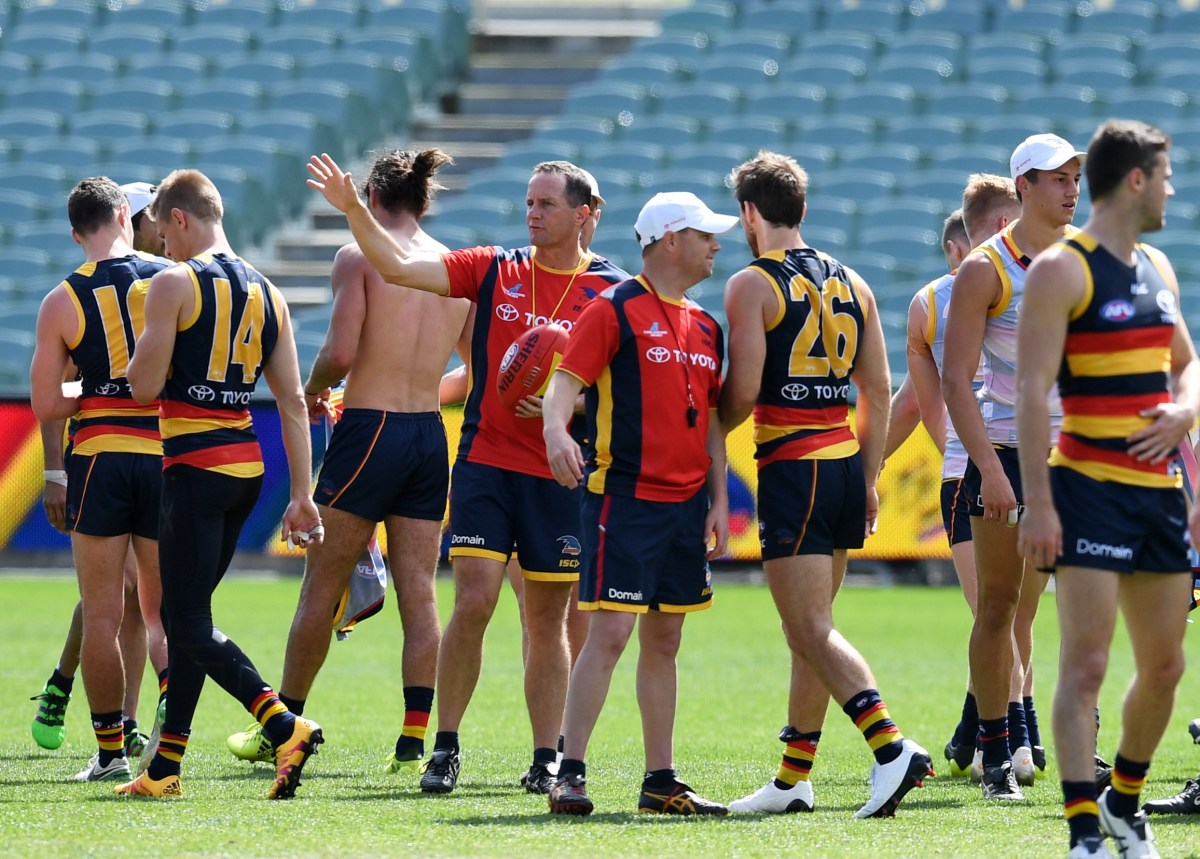
DON’S PARTY: Can Pyke orchestrate the long-awaited Crows’ masterpiece tomorrow? Photo: Tracey Nearmy / AAP
It’s been a long and painful road since that moment, three years ago, when the Adelaide Football Club was declared to have lost its way. Lost its greatness.
This week, Chapman must allow himself a moment’s vindication over the events of that week, and the many since.
But, he notes, “we haven’t got the job done yet”.
Richmond stands in the Crows’ path to premiership glory, and they have their own hard-luck tale to tell. Of financial failure and boardroom spats, and coach after coach after coach…
Of 37 years without a flag, of no Grand Final appearance since 1982, of no finals wins at all for 16 years, and even that was a lone 2001 semi-final victory nestled between major round drubbings.
“There’s a whole set of uniqueness around this match – both clubs have their stories,” notes Chapman.
For the Crows, it will be a moment to try and write one of their greatest chapters, forged out of some of their worst.
To create the masterpiece of which Walsh once spoke – and ensure the premiership flag flies navy, red and sunflower-gold.
And if they pull it off, it will be by adhering to the principles he espoused – principles lived out under the unassuming Don Pyke: team first, elite standards, get the job done.
“They’ve signed up to Don’s mantra,” says Chapman.
“And this is their time. They’ve earned the right to have a crack at a big mantle.”
